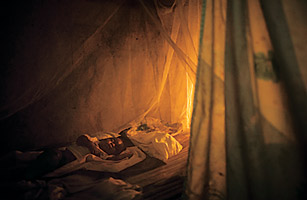
Three-month-old Sindrella Okello sleeps safely beneath a mosquito net in Apac, Uganda.
(3 of 3)
To be fair, he was not alone. Many companies are doing well by doing good, realizing that, say, an HIV program at a South African mine cuts absenteeism. A nuanced vision of a successful company is taking hold, one that elevates social responsibility to a core mission — and was backed with $14.5 billion in the U.S. in 2007, according to the Chronicle of Philanthropy.
Partly as a result of Chambers' prodding, that new way of giving aid has encouraged Western governments to open their wallets too. Funding for malaria has exploded from $50 million in 1997 to $6.6 billion for the Global Fund to Fight AIDS, TB and Malaria and $5.5 billion for the President's Malaria Initiative, a U.S. program launched in 2005. A good example of how aid is creeping into our lives in subtler ways is Unitaid. Founded in 2006 to raise money for AIDS, TB and malaria through small taxes on air tickets and check boxes on e-tickets, it has so far raised $870 million.
Religion has caught the bug too — as it were. Rick Warren's Saddleback Church in Lake Forest, Calif., is training health workers in western Rwanda. The heads of the Muslim and Christian faiths in Nigeria are training hundreds of thousands of imams and priests in malaria care and net and drug distribution. Help also comes from retired politicians like Bill Clinton and Tony Blair, who have both set up aid foundations. Blair, whose Faith Foundation is assisting the Muslim-Christian collaboration in Nigeria, told Time, "The nature of help is changing. The malaria campaign is about as good an example as you get of rebalancing the respectability of the aid case."
Real Results
The payoff can be spectacular. malaria has been at least halved in nine African countries since 2000. Ethiopia and southern Sudan should reach universal protection this year; Chambers predicts global bed-net coverage in the first quarter of 2011, just months past his target. A visit last August by Chambers and Chan to the children's ward of a Zanzibar hospital produced whoops of joy from Chan. It was empty.
That success is hardly universal — or permanent. Zanzibar has eradicated malaria twice before but each time reimported it from mainland Tanzania. Kenya, an early success story, has slipped. Congo has only just got going. What do these failures have in common? Bad government. When Chambers visited Tanzania in August 2009, he found an approved $111 million Global Fund grant lying unclaimed for want of a single signature. In Uganda, Global Fund grants totaling $367 million were suspended over allegations — now before the courts — of corruption involving three health ministers and several aid groups. "The house is on fire," Chambers told a meeting of ministers and aid groups in Kampala last August. Chan was blunter: "We will hold you to account on behalf of the 350 women and children who die every day here." That, too, is a face of aid.
In Apac I visited the town hospital the morning after I arrived to find 30 newly admitted babies. When I returned that night, there were another 10. Martin, 27, was the only nurse on duty, and he was equipped only with quinine — long ago phased out in the West when malaria became resistant to it — headache pills and sugar solution. I watched him try to stick an IV needle into a 4-month-old girl, Doris Amang. He tried the backs of both her hands, then both sides of her head. Doris screamed and kicked. After pricking her 12 times, he gave up. Her veins had collapsed from dehydration. The windows were wide open. I watched a mosquito settle on Doris' cheek.
The next day, I returned. There were 50 babies now but no sign of Martin or any other staff member. The mothers were looking to me, but I had nothing to offer. I left the ward, walked quickly to my car and headed for the gates. Nearby was a naked street walker, feeling his way along the fence. As I roared past, I caught a glimpse of his startled expression, his emaciated face. I drove out of town and didn't stop until I reached Kampala.